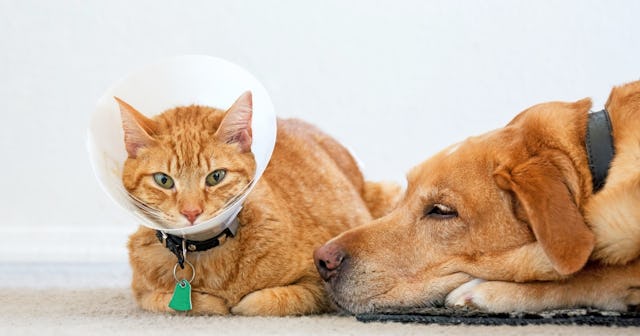All The Spaying A Cat Aftercare Info You Need For Your Feline Friend

There are many things to consider when it comes to spaying a cat aftercare. Your furry friend has just been through a lot, so it’s up to you to nurse them back to 100 percent. If you’re not already familiar, spaying or neutering an animal is, well, fixing them so they can’t procreate. A spay surgery is for female animals, and neutering is for males. It’s a common procedure that many pet parents choose to have for their animals so that they don’t end up with a ton of babies. Plus, if your female cat isn’t spayed, she’ll regularly go through heat, which is a whole other experience you’ll have to handle with her. And though you love your cat, it’s a lot to deal with!
Before you get your cat spayed or neutered, make sure you’re well prepared. This includes speaking with your vet and ensuring you have a healing environment for your kitty when she comes home — after all, your pet is part of the family. Here’s everything you need to know.
How do you take care of a female cat after being spayed?
When you get your cat spayed or neutered, they are having surgery, so you want to treat them gently when they get home. This is a totally routine surgery for animals, and it’s a pretty straightforward one for vets to perform. Your cat should be in and out of the vet and back home to recover in no time, but you want to make sure you’re giving your kitty a good environment to come home to and heal in.
After your cat has returned from the veterinary office, it’s important to keep them happy and calm. If your cat tends to go outside, keep them indoors until they’re completely healed. You should also keep them in a confined space so your cat doesn’t run or jump around while they heal.
Post surgery, it’s also important to keep their incision area dry. Do not wash that space for at least seven days post procedure. Make sure to check your kitty’s incision daily, so you know if anything changes. If you feel like your cat’s incision is severely infected or they’re in pain, take them to an animal emergency center as soon as possible.
Your cat will need time to recover and probably won’t be herself for a day or two following the surgery. She probably won’t want to eat or drink right away and will most likely want to sleep. Because the cat has been on medication at the vet — and potentially medication after coming home — she’ll need time just to sleep it off. That’s typical and something you should let her do.
How long should I keep my cat confined?
Fortunately, cats heal pretty quickly from a spay or neuter. It’s a good idea to keep them confined for at least two days after surgery, though. This will give the incision time to heal and will keep them in a low-stress environment, especially if you have other animals in the house. You want your cat to be able to rest comfortably without distractions or stressors, so keep them in a cage or a bathroom or closet. Make sure there’s plenty of soft spots for her to curl up in as well. If possible, try not to confine her in a place where she can hide too much since you want to check on her frequently and give her medicine if she needs it.
What should you watch out for after a cat gets spayed?
Your cat will likely not be hungry or thirsty for a bit after the surgery, but make sure she doesn’t go too long before eating or drinking. The next day, she should be ready to eat at least a little bit, but if she’s not, try encouraging her to eat. If she still won’t, monitor her and call the vet if she still won’t eat.
You also want to make sure your cat isn’t rowdy because you don’t want her to tear open the incision. This is why keeping her confined is a good idea. Don’t encourage her to play or run around for a couple of days. Keep an eye on the incision for any redness, bleeding, swelling, etc. You should also check your cat for white-colored gums, rapid or slow breathing, and lack of appetite. If you see anything concerning, it could be infected or not healing properly, in which case, call the vet.
And when it comes to that incision, you also don’t want to let your cat lick it, at least for a few days. That means she may need a cone of shame. She won’t like it, but she may need it. She may also need pain medication, but your vet will provide you with anything they deem appropriate. Whatever you do, don’t give your cat any human medication.
If your cat is behaving oddly in any other way, whether she’s super lethargic for more than a few days or if she’s throwing up, call your vet right away.
This article was originally published on